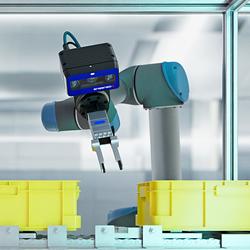15 Competitors Selected for DARPA Spectrum Challenge
Three wild card selections remain in competition to demonstrate solutions for more robust wireless radio technologies
As wireless devices proliferate and the radio spectrum becomes ever more congested, all users have a common interest in radio technologies that can accommodate the largest number of users but still enable priority traffic to get through. The DARPA Spectrum Challenge-a competitive demonstration of robust wireless technologies-recently announced the selection of 15 of 18 semifinalists for $150,000 in prize money. DARPA plans to fill three remaining wildcard slots in August 2013 before the September 2013 semifinals at DARPA's offices in Arlington, Va.
"The participants represent a broad mix of organizations, from top research universities to small, energetic startups," said Yiftach Eisenberg, DARPA program manager heading the Spectrum Challenge. "With this much enthusiasm, we are expecting some real breakout ideas."
Out of 90 initial registered teams, 46 completed a rigorous three-week qualification process. DARPA then selected the 15 highest-scoring teams to compete.
The Spectrum Challenge semifinals competition consists of two separate events, with the winner of each event taking home $25,000. Each event requires teams to transfer the same file between a source radio and a destination radio. All teams would have to share 5 MHz of bandwidth, which would require the teams' signals to overlap. DARPA would provide all teams with the same hardware and data, enabling each team to win or lose based on their software algorithms alone. The scenarios are:
Competitive: Two radios enter, one leaves. The first team to transmit its entire file wins. Teams can attempt to evade, jam or control competitors' signals while managing environmental obstacles. Contestants must play both offense and defense to get their files transmitted fastest. This event would test conditions most applicable to military communications.
Collaborative: Three radios enter, all leave. Teams must work together to transmit all three of their files in the shortest time despite environmental obstacles. Teams cannot coordinate in advance on how to share spectrum. This event would test conditions potentially helpful for coalition communications, but also have possible future commercial applications.
"Here's the question: Can we design smart radios that figure out how to share spectrum and get signals through without users coordinating first?" Eisenberg said. "We want competitors to design programmable radios that can sense their immediate spectrum environment. Those radios then must dynamically and automatically adapt their transmissions to account for dynamic users in dynamic environments."
After this initial round, the 18 teams will progress to the Spectrum Challenge finals event in March 2014 at DARPA. The Final Challenge competition would follow the same structure as the preliminaries but award twice the prize money-$50,000 per event.
DARPA's announcement of the Spectrum Challenge contestants supports Administration efforts in this domain, as highlighted by the recent White House announcement that the federal government has allotted $100 million for research into spectrum sharing and advanced communications.
More information about the Spectrum Challenge is available at http://go.usa.gov/bqQW.
Featured Product

